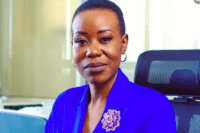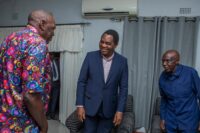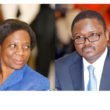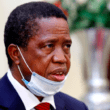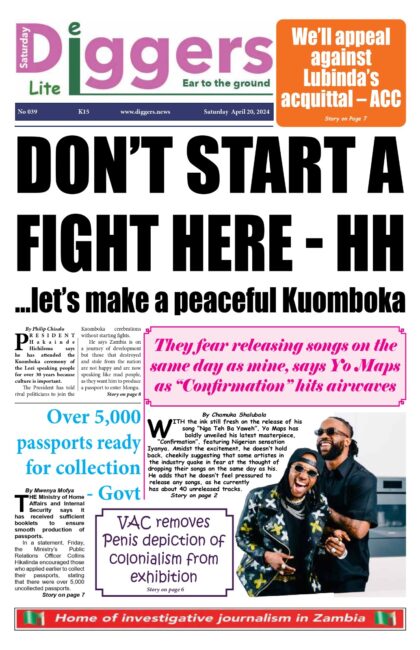The Constitutional Court has concluded its hearing over the eligibility of President Edgar Lungu to stand for another term in 2021 and judgement in the case is due anytime soon.
The article below was originally published on 7 November 2017 and is being republished here in its original form only as a flashback.
When Kenya’s Supreme Court judges annulled the results of the country’s presidential election this September, they attracted plaudits from across Africa for acting independently and for refusing to bow before presidential power. But Zambia’s President Edgar Lungu was not among their admirers. Instead, on 2 November, he issued a stern warning to Zambia’s own judges not to follow the example of their Kenyan counterparts. “Do not become a copycat and think that you are a hero if you plunge this country into chaos,” he warned.
These comments were directed at Zambia’s Constitutional Court (ConCourt), which is currently considering a case to determine whether the president is eligible to run for another term in office in 2021. Lungu was first elected in the 2015 presidential by-election following Michael Sata’s untimely death in office. He was then re-elected in the controversial August 2016 polls. The Constitution contains a clear two-term limit for the presidency, but Lungu’s supporters argue that his first term of just 18 months should not count towards this total.
This January, Lungu himself declared that he is eligible to stand in 2021 elections and challenged opposing voices to seek the interpretation of the ConCourt. A few days later, four small opposition parties did just that, petitioning the court for “a declaration that President Edgar Lungu is eligible to contest the 2021 Presidential election”. In response, the influential Law Association of Zambia (LAZ) and the main opposition United Party for National Development (UPND), who argue that the opposition parties were proxies of Lungu, joined the case seeking a counter-declaration. The case comes up for hearing on 15 November.
“That I will not allow”
To avoid misinterpreting what Lungu said, it is worth quoting his remarks at length:
“People are saying Zambian courts should be like Kenyan courts, that they should be brave and make decisions which are in the best interests of the people, but look at what is happening in Kenya now…To my friends in the court system, I say don’t plunge us into chaos by imitating or emulating Kenya or any other court system for that matter which does not care about the interests of the people.
“I am saying this because there are people outside Africa and some within Africa who want to bring confusion in Africa. They have started with South Africa, Kenya and Zambia for a regime change. There are people out there who just want regime change because they want to take over from us as managers…That I will not allow.
“To my colleagues in the judiciary, my message is just do your work, interpret the law without fear or favour; look at the best interest of this country…Those people who don’t like peace and freedom will say ‘President Lungu is intimidating the courts of law’. I am not intimidating my colleagues in the judiciary. I am just warning you that I have information that some of you want to be adventurous. Your adventure should not plunge us into chaos, please.”
Numerous organisations and individuals have condemned Lungu’s remarks. LAZ called on the president to retract his comments. The UPND accused Lungu of outright intimidation. And the prominent US-based law professor Muna Ndulo described the statements as another example of Lungu’s wanton disregard for rule of law and further evidence of “the creeping dictatorship in Zambia”.
This condemnation is necessary, but not sufficient. Zambians also need to understand why Lungu is making such comments. Contrary to what some of his opponents have argued, the president’s implied threats were neither random nor a result of ignorance and incompetence. Lungu is highly skilled and has a proven record of undermining democratic institutions in a committed, strategic and well-defined manner. If Zambians wish to reclaim their democratic institutions and space, they will do well not to underestimate Lungu and the lengths to which he is prepared to go in his bid for absolute power. His thinly veiled threats to the ConCourt should be seen as part of his wider strategy to stay in power beyond 2021.
Pressuring the judges
President Lungu’s remarks were directed at different audiences for different objectives.
The first was the ConCourt itself. His objective is clearly to intimidate the judges, especially those who are unsure about the consequences of ruling against the presidency. Threats that a “brave” judgement would lead to chaos make it less likely that undecided judges will want to take the risk. This strategy may work; the president only needs to persuade a majority of the judges to get the ruling he wants.
Many perceive the ConCourt as being predisposed towards Lungu to begin with. Its judges were all appointed by the president – even though none of them meets the constitutional requirements to serve on the Court – and the body ruled in his favour over the challenged election results last year. Sceptics therefore suggest that Lungu may not need to work particularly hard to win over a majority.
Public confidence in the Court is already low, but the president’s comments put them in a no-win situation. If the judges do make a “brave” ruling on the 2021 issue, Lungu can accuse them – and he has already formulated the accusation in advance – of fomenting chaos. If they rule in his favour, they will be perceived by much of the public as having given in to presidential pressure. (This latter route, in which a high stakes judicial ruling is not seen to be credible, could also lead to chaos.)
Rousing supporters
The second audience Lungu was speaking to are his supporters in the governing Patriotic Front (PF). On this front, he has two objectives.
Firstly, through his comments, he was effectively encouraging his followers to exert pressure on the judges to act in “best interest of this country”. Supporters could easily mobilise to block the courts or even protest against independent-minded judges, confident that the police would not disrupt such efforts.
This strategy has been deployed before. At the height of last year’s legal challenge against Lungu’s re-election, PF supporters camped outside the ConCourt to demonstrate against its unanimous decision to extend the hearing of the petition for a week. The next day, the Court, by majority opinion, set aside its earlier judgement even in the absence of a formal appeal and disposed of the matter inconclusively.
Secondly, Lungu’s speech seems intended to prepare his supporters to act in the event of an unfavourable – and, by his argument, illegitimate – verdict. His reference to unspecified foreigners seeking regime change is meant to portray his prospective disqualification as the result of an unholy alliance between judges, the opposition and interfering outsiders. His empty rhetoric against foreign powers also helps to pre-emptively discredit possible international criticism.
This strategy is undoubtedly a trick he has picked up from authoritarian figures elsewhere in Africa. Once rightly regarded as a beacon of democracy on the continent, it is disturbing that the Zambian president’s most notable political friendships are now with the likes of Zimbabwe’s Robert Mugabe, Uganda’s Yoweri Museveni and Rwanda’s Paul Kagame.
Warding off challengers
Lungu’s third audience are his opponents within the ruling PF, particularly budding successors eyeing his position. A ruling from the ConCourt that he is ineligible for 2021 would strengthen their hand and reduce Lungu to a lame-duck president.
By declaring his presidential candidature (subject to his party’s endorsement) even before the ConCourt pronounces on the matter, Lungu is effectively warning individuals within the PF that he is going nowhere and that they will face the same fate as Chishimba Kambwili, the former Minister of Information who was recently expelled from the party for campaigning to succeed him. Privately, several prominent PF members are hoping that the ConCourt will rule against Lungu as this would open the way for their own ambitions.
What Lungu fears
As well as examining Lungu’s strategy, it is also important to understand the reasons behind his determination to remain in office. Broadly speaking, there are two reasons he is unwilling to step down any time soon.
The first is fear of prosecution. All of Zambia’s former presidents, aside those who died in office, have faced trials after leaving office and Lungu is already facing questions about the sources of his newfound wealth. Possible prosecution for corruption, embezzlement or criminal misuse of power cannot be far from his mind. The solution is to remain in power for as long as possible or until a pliant successor can be installed.
In fact, Lungu might already be thinking about trying to change the constitution to either extend the number of terms permissible or abolish term limits altogether. For this to be possible, he probably needs to stay in power until 2026 to consolidate his power push through a constitutional amendment. This, however, relies on the ConCourt ruling in his favour – hence his concerted attacks.
Lungu got his way with the court over the 2016 election challenge and one wonders what threats were made at the time of that even more crucial decision. One might fairly assume that it was because the warnings were so dire that the judges decided to not even hear the petition, let alone make a judgment. Regardless of what happened, the fact is that if a sitting president is able to both rig an election and control the ConCourt, it is hard to see how he or she can ever be voted out of office.
Lungu’s inner circle
A second reason Lungu may be so unwilling to leave office is that he is beholden to the business and political interests of certain individuals that contributed to his rise. According to well-placed PF insiders, this group is fearful of what might happen if Lungu steps down and that, in seeking another term, the president is not speaking for himself alone.
Lungu has many political and business figures around him, many of whom were marginalised under the late President Sata but have flourished under the new president. This group feels its time in the corridors of power has been too brief thus far and wants more time to accumulate through the state. They can see clearly how those they replaced are now languishing. Senior government and ruling party figures say that this circle has captured virtually all state institutions.
The term “state capture” is topical in South Africa, but applies fully to the situation in Zambia too. In fact, in Zambia, it is not only the executive that has been captured, but a whole range of institutions including the police, security services, investigative agencies, media, electoral commission and National Prosecution Authority. One could arguably add the judiciary, parliament and various other bodies to this list too. Lungu’s administration has successfully closed down the critical free press and almost succeeded in muzzling civil society. Many believe the president’s allies are behind the arrests of prominent opposition figures. Meanwhile, this group has even extended its influence over the church thanks to the president’s new powers to appoint a Minister of Religion.
Through misuse of the police, impunity and bogus prosecutions, Lungu and his associates have created a general climate of fear in Zambia and are therefore effectively in charge of everybody except for those seeking martyrdom. How far this group is willing to go to maintain this grip on power remains to be seen. Could political disappearances and murders that have blighted other African democracies be Zambia’s fate too?
The weight of history
Even in Zambia’s continuing fall from grace, Lungu’s public and overt threats against the judiciary represent a watershed moment. Previously, the president strove to stick to the legal position on democracy, constitutionalism and separation of powers. For instance, when the leader of the opposition, Hakainde Hichilema, was arrested on what appeared to be a trumped-up charge of treason this April, Lungu claimed to have nothing to do with the arrest. He claimed it would be improper for him to intervene in the independent arms of government. Laughable as these claims of non-interference were, they wrong-footed opponents who were left looking for evidence of how he had influenced these supposedly independent institutions.
Now, however, Lungu is making threats against the judiciary so thinly veiled that even the masquerade of propriety has fallen away. Words that have probably long been uttered in private, and which would explain some of Lungu’s illegal actions, are now being announced publicly.
This may be the start of a new phase. One in which the capture of state institutions and creation of a climate of fear is so complete that Lungu feels confident enough to make explicit the structure of his creeping dictatorship. One in which there are no longer any state institutions able to challenge or oppose him.
Zambia’s judges on the ConCourt must surely feel the weight of history on their shoulders. Other countries where judicial independence and presidential term limits have been ignored have slid into disorder, authoritarian rule and dictatorship. It is no exaggeration to say that the fate of Zambia’s democracy lies in their hands.





